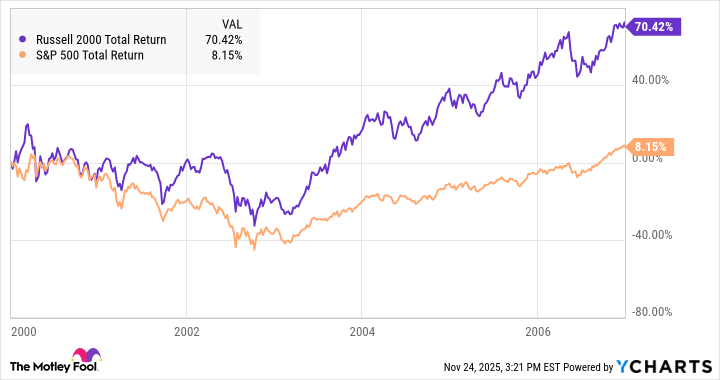Vanguard's largest exchange-traded fund (ETF) is the Vanguard S&P 500 ETF (VOO +0.67%). With an enormous $1.5 trillion of assets under management (AUM), the index tracker serves as the foundation of many portfolios.
The Vanguard Russell 2000 ETF (VTWO +0.74%) is far less popular, with $13.9 billion of AUM. But on average, the small-cap stocks in this fund come with far lower valuation multiples than their S&P 500 (^GSPC +0.65%) brethren. Does that make VTWO a better buy than VOO right now?
VTWO vs. VOO by the numbers
First, let's check out the basic details of VTWO and how they compare to its ubiquitous cousin, VOO:
|
Metric |
Vanguard Russell 2000 ETF |
Vanguard S&P 500 ETF |
|---|---|---|
|
Assets Under Management |
$13.9 billion |
$1.5 trillion |
|
Expense Ratio |
0.07% |
0.03% |
|
Annualized SEC yield |
1.2% |
1.1% |
|
Number of stocks |
1,992 |
504 |
|
Average P/E ratio |
17.4 |
28.5 |
|
Median market cap |
$3.4 billion |
$417 billion |
|
1-year total return (with reinvested payouts) |
1.5% |
13.7% |
|
Inflows (outflows) in 2025 |
(1.5%) |
18.1% |
Data collected from Vanguard, YCharts, and Finviz on Nov. 24, 2025.
These funds may sound similar when rolling off the tongue, but they are dramatically different. VOO represents about 500 of the largest stocks (by market cap) in America, heavily weighted toward the massive Magnificent Seven stocks that have ruled the market since 2022. VTWO tracks nearly 2,000 small-cap stocks instead. This category has underperformed the S&P 500 giants in recent years.
The funds themselves have behaved differently, too. Investors keep piling into VOO, increasing its AUM by 18% this year while backing away slowly from the VTWO alternative. Only 20% of Vanguard's ETFs have seen negative asset flows in 2025, and the Russell 2000 tracker is one of them.

NASDAQ: VTWO
Key Data Points
Small-caps are out of fashion (for now)
So Wall Street is broadly more interested in VOO than in the Vanguard Russell 2000 ETF this year. At the same time, many investors are concerned about overblown valuations within the aforementioned Magnificent Seven group and the unstable global economy. These market artifacts could add up to a painful price correction at some point. Nobody knows when this correction will arrive or how deep the price drops might get, but VOO and the S&P 500 seem more exposed to this incoming thunderstorm.
Some market history seems to support this idea. For example, Russell 2000 stocks took a lighter hit than the S&P 500 when the dot-com bubble popped, swiftly followed by the 9/11 tragedy. Vanguard's ETFs didn't exist back then, but here's how the underlying indices performed from the turn of the millennium to the end of 2006:
As you can see in that chart, Russell 2000 stocks can outperform the classic S&P 500 index in and after times of heavy market turmoil. Every situation is different, but there's one clear example.
Small-caps deserve a spot at the table
I can't guarantee that small-cap stocks will outperform the S&P 500 in 2026, or over the next few years. But this class of stocks does look undervalued next to their mega-cap relatives, and I wouldn't be surprised to see a snapback coming up.
In the meantime, Russell 2000 stocks tend to keep up just fine with the S&P 500 in the long run, through good times and bad. It may feel different when you look at charts from the last five or 10 years, where VOO's large-caps approximately doubled the total returns of VTWO's small-caps.

Image source: Getty Images.
VOO is nearly always a reasonable choice, which explains why it's such a popular portfolio cornerstone. But in times like these, it could make sense to give VTWO some attention, too. Like I said, you're not risking a whole lot when moving funds into the small-cap sector instead of the S&P 500 -- and it might just be a superior pick if the Magnificent Seven run out of steam.
So I wouldn't transfer all my VOO shares into VTWO, not even in uncertain times like these. But the Russell 2000 ETF deserves a second look and maybe a smaller position, especially if you see storm clouds around Wall Street today. Personally, I'm leaning toward the "buy" button on this ETF right now.








